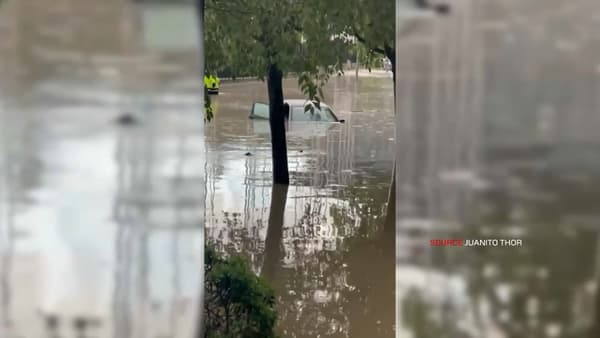Part of Spain is on a meteorological alert this Tuesday due to a major episode of rain that affects the Iberian Peninsula, where waterspouts have caused the occasional flood in recent days after months of drought.
It rains too late in the face of drought
Ces fortes pluies, trop dives selon les spécialistes pour résoudre le serious deficit hidrologique dont souffre l’Espagne, notatamente touché les régions du sud-est, dont les provinces d’Almeria et d’Alicante, avec de nombreux orages enregistrés au cours du weekend.
Torrential rains also fell on Madrid, particularly on Monday night, causing the closure of some roads and delays in several metro lines, affected in some places by impressive water infiltrations.

According to the Spanish Meteorological Agency (Aemet), which this Tuesday kept part of the territory under yellow or orange surveillance due mainly to the risk of hail, electrical storms and violent gales, this rainy episode should continue over the next few days.
This should allow an “important positive contribution to the rainfall deficit” that Spain has been suffering for months, hit by a historic drought, with serious consequences for its entire important agricultural sector.

Historic heat and drought in April
According to specialists, these torrential rains – which tend to run off instead of infiltrating into the ground – are, however, insufficient and late to put an end to the deficit suffered by the country’s groundwater tables and reservoirs.
According to the Ministry for the Ecological Transition of Spain, these reservoirs saw their level drop during the last week of May to 47.5% of their capacity, compared to 47.7% the previous week, that is, almost 20 points less. than the average of the last ten years at this time. time of year (68.1%).
According to Aemet, Spain experienced the hottest and driest month in April since meteorological records began in the country. This heat wave occurred after several months of drought, after a year 2022 considered the hottest in recent Spanish history.
This situation led the Government to announce in mid-May an emergency plan of more than two billion euros, aimed mainly at the agricultural sector – the lack of water has led many farmers to abandon spring sowing, particularly cereals and oilseeds-.
Source: BFM TV

